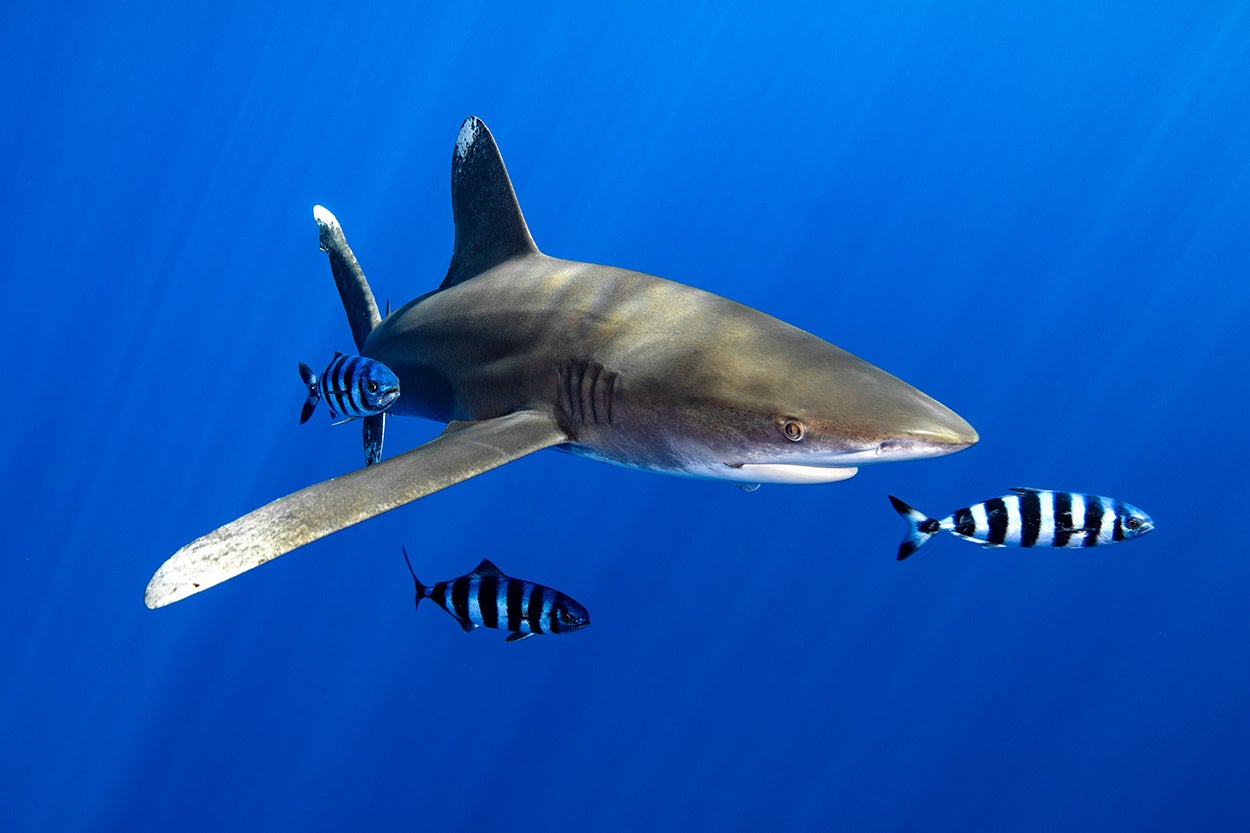A Big Year for Sharks
The work to protect sharks is a daily effort, especially with climate change and biodiversity loss. As the year ends, we're celebrating progress.
Unless you’re heading to the beach, we’re guessing you aren’t thinking about sharks in your holiday celebrations. Sharks may seem like an odd choice to celebrate at the end of the year, but here’s why you should:
Sharks have existed for over 450 million years. That’s at least 50 million years longer than trees, including the kind you may have decorated this year if you celebrate Christmas, and 444 million years older than our first human ancestors. Dinosaurs evolved and went extinct, and sharks traversed the ocean for it all. Sharks may not look the same as they did when they first evolved, but their survival on this planet has been constant and serves as a testament to the strength and resilience of these incredible predators. That’s why it is so shocking that human activities beginning only 50 years ago are threatening extinction for a third of the shark species on Earth. We’re fighting to reverse this trend.
Here’s a brief look at some of our work and the positive changes that have happened this year to help these fascinating creatures:
The demand for fins
Up to 73 million sharks are estimated to be killed annually for their fins. Shark finning – cutting the fins from a shark and discarding the living carcass at sea – is a cruel practice that has developed in response to this demand for fins. That’s why Congress passed the Shark Fins Sales Elimination Act (H.R.2811/S.1106) this month. While shark finning is already illegal in U.S. waters, their fins are still being sold across our borders, often with countries that have weaker conservation laws. This bill stops trade in the U.S. and sends a message to other countries that we oppose the shark fin trade, which contributes to the practice of shark finning.
Additionally, in November, Parties to the Convention on International Trade in Endangered Species of Wild Fauna and Flora (CITES) adopted landmark proposals to dramatically increase safeguards for nearly 100 of the world’s most-traded sharks and rays. With the new listings, most species in the global fin trade are now regulated. The U.S. agreed to the proposals. Full implementation of these laws will be critical to reducing shark finning and trade.
Overfishing
This month, a key regional fisheries management organization – the Western and Central Pacific Fisheries Commission – adopted a ban on the use of shark lines and wire leaders, both of which aid longline fishing fleets to target sharks. Shark lines are specifically designed to catch sharks on hooks. When attached to hooks, wire leaders increase the likelihood of retaining a shark once it’s caught by making it harder for it to bite its way off the line (as it might with a nylon leader). The ban aims to reduce the amount of oceanic whitetip and silky sharks which are killed unintentionally when fleets are targeting other species. (The Western and Central Pacific Fisheries Commission prohibits fishing vessels from intentionally catching whitetips and silky sharks. ) The measure is also expected to reduce the catch of less-threatened blue sharks. Enforcement of this new ban will be key. One of the best ways to accomplish this is by requiring human or electronic observers on vessels.
Illegal, Unregulated, and Unreported (IUU) fishing
IUU fishing can involve shark finning, overfishing, bycatch (when animals are incidentally caught in fishing activities), human trafficking, forced labor, and other harmful practices. Regulating IUU fishing is difficult because it not only occurs within the jurisdictional limits of a country’s coastal waters, but also beyond in the high seas where governance and enforcement is complicated and sometimes nonexistent. In response to the growing need to act on IUU fishing, Congress passed provisions from the Illegal Fishing and Forced Labor Prevention Act (H.R.3075) this month that strengthen provisions in the High Seas Driftnet Moratorium Protection Act, a law which allows the U.S. to list nations that engage in IUU fishing, the catching of sharks, and the bycatch of protected species and then potentially implement sanctions against those nations that do not take corrective action. The new language will:
- Require that nations which target or incidentally catch sharks on the high seas or in another nations’ waters, bring the sharks into port with their fins naturally attached to their body. This requirement discourages shark finning.
- Require the United States to take action against repeat offenders who engage in illegal and unsustainable fishing practices.
- Provide more ways to identify and sanction nations that engage in illegal fishing, including where nations engage in practices of forced labor or oppressive child labor.
- Expand the U.S.’s ability to encourage (and if necessary, pressure) nations to regulate large-scale fisheries to reduce bycatch and increase sustainability.
The work to protect sharks is a daily effort, especially with climate change and biodiversity loss. But sharks are a whole lot better off with these new laws and policies. So before we continue our fight to save sharks, we hope you’ll join us in celebrating some of our wins from this fin-tastic year!
Established in 1989, Earthjustice's Policy & Legislation team works with champions in Congress to craft legislation that supports and extends our legal gains.
